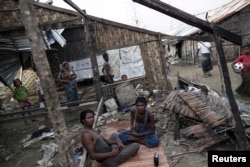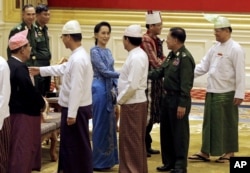The United Nations has given Myanmar's incoming civilian government led by Aung San Suu Kyi's National League for Democracy (NLD) 100 days to improve living conditions for the country's ethnic minority Rohingya community. But doubts remain over the new government's ability to deliver.
On Tuesday, the outgoing government lifted a nearly four-year state of emergency imposed on the volatile Rakhine state where the Rohingya are currently denied citizenship and say they are heavily persecuted.
The Rohingya are unable to travel freely in Myanmar, which is also know as Burma, and cannot marry or have children without official permission. They are also largely barred from higher education and face the constant threat of violence as Buddhist extremism gains traction.
Human Rights Watch (HRW) on Wednesday urged President Htin Kyaw to ensure that lifting emergency laws would translate into ”real improved” respect for minority rights in the western state.
“The NLD needs to convene an effort to end human rights abuses against all communities in Rakhine state,” Phil Robertson, deputy-director for Asia at HRW, told VOA. “This should involve an overhaul of regulations, policies, and actual implementation on the ground.”
A big part of the problem is the 1982 citizenship law, introduced by the former junta, which stripped the Rohingya of their official status in Myanmar, also known as Burma. Since then, they have been treated as interlopers from neighboring Bangladesh. Their persecution has escalated since the country introduced democratic reforms with nearly 120,000 people still confined to filthy displacement camps.
A spokesperson for the U.N. Office for the Coordination of Humanitarian Affairs (UNOCHA) said the situation remains dire throughout the impoverished state.
“We are very concerned that the rainy season is coming up and some of these shelters could fall down,” said Pierre Peron, UNOCHA's Public Information and Advocacy Officer, citing additional concerns about water, malnutrition, healthcare and livelihoods. “But the situation for up to one million stateless Rohingya living [outside the camps] in Rakhine is equally much of a problem.”
Some 25,000 displaced Rohingya are estimated to have returned to their villages in the past few months, but only in remote and rural areas with relatively little communal friction. The state capital, Sittwe, enforces strict segregation for its Muslim population, which has been isolated in a small ghetto fenced with barbed wire. Prospects for re-integration there are bleak.
Nearly one-tenth of the Rohingya population is estimated to have fled Myanmar since 2012, sparking a humanitarian crisis and clampdown on human trafficking in Southeast Asia last year that led to a temporary halt in the exodus. Activists fear that desperate people will again attempt to escape Myanmar by sea if the NLD does not swiftly signal a change in policy from the previous military-backed government.
“There has been no boat departure at all since December,” said Chris Lewa, coordinator at the Arakan Project, which monitors human trafficking networks. “The main reason is the fact that Thailand is closed as a transit country and anti-trafficking campaigns are still ongoing.”
Hope that Aung San Suu Kyi will bring positive changes for the Rohingya is also a factor.
“People are very hopeful and positive and very happy to see a new government,” said Wai Wai Nu, an ethnic Rohingya activist and former political prisoner. “They think that the new government will bring justice and peace.”
“This is the first civilian government after 50 years so they should be able to bring positive change and end discrimination and persecution in Rakhine state,” she added. “These will be their main tasks for the next five years.”
But others doubt that Aung San Suu Kyi’s government will live up to expectations.
According to Robertson, HRW has unsuccessfully pushed for a meeting with Aung San Suu Kyi to discuss the Rohingya crisis for several years. Speaking out on the issue is extremely controversial in Myanmar and so far Aung San Suu Kyi has stayed tight-lipped.
“In the past … we recognized that the NLD had limited ability to change policies on the Rohingya, though we did urge them to speak out publicly on this and they generally didn't do so,” Robertson said. “Now that the NLD has formed the government, it’s time for Aung San Suu Kyi and her party to say clearly what their policies will be on ending the systematic discrimination and abuse suffered by the Rohingya.”
Foreign Minister Aung San Suu Kyi on Friday attended the office of the ministry for the first time in her official capacity. Aside form being the first woman to hold that position in the nation's history, she was recently selected by NLD parliamentarians to assume an additional role of "special advisor to the state." While the bill proposing the new role was approved by the upper house on Friday, military representatives have challenged the legislation, calling it unconstitutional.
On Friday, a state-run newspaper ran an editorial calling for presidential amnesty for detained students who staged protests against the country's education law. It was the first time the paper referred to the detainees as "political prisoners."
According to the Assistance Association for Political Prisoners (Burma), a support group to political prisoners, over 100 activists are currently imprisoned in Myanmar, and more than 400 activists have been charged under various acts.
When contacted by VOA, NLD spokesperson Win Htein said the conflict in Rakhine was one of a multitude of issues facing the country.
“There are thousands of problems in our country. [The] Rakhine state problem is one of the thousands,” said the Central Executive Committee member. “We will [prioritize] some of the problems but I will not tell exactly what intention we have. What I can say is that we will deal with the problem as soon as possible.”
The U.N.’s Special Rapporteur for Human Rights in Myanmar has given the leadership some three months to lift travel restrictions for the stateless group. Win Htein said the NLD was not opposed to such a move as long as they could prove their citizenship.
“If they really have citizenship — real citizenship — we are not against their free movement inside the country,” he said. “But we haven’t decided what action we will take.”
However, when pressed on the issue of Rohingya citizenship, he snapped.
“Peace problem, national development and national reconciliation [are] much more important than other issues,” he said. “You seem to think there is only one problem in Burma. It’s absurd. You are not interested in our peace process or national reconciliation or our formation of new government. I’m really fed up with the foreign media.”






